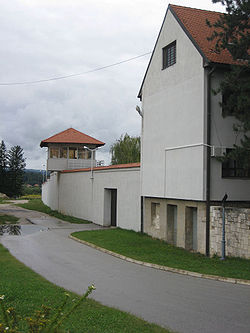
Lepoglava prison
Encyclopedia

Croatia
Croatia , officially the Republic of Croatia , is a unitary democratic parliamentary republic in Europe at the crossroads of the Mitteleuropa, the Balkans, and the Mediterranean. Its capital and largest city is Zagreb. The country is divided into 20 counties and the city of Zagreb. Croatia covers ...
. It is located in Lepoglava
Lepoglava
Lepoglava is a town in Varaždin County, northern Croatia, located southwest of Varaždin, west of Ivanec and northeast of Krapina.A total of 8,271 people in the municipality lives in the following settlements:* Bednjica, population 214...
, Varaždin County
Varaždin County
Varaždin County is a county in northern Croatia. It is named after its county seat, the city of Varaždin.-Geography:In addition to the city of Varaždin, the county includes the towns of Ivanec, Ludbreg, Lepoglava, Novi Marof and Varaždinske Toplice, as well as 22 municipalities...
, northern Croatia
Croatia
Croatia , officially the Republic of Croatia , is a unitary democratic parliamentary republic in Europe at the crossroads of the Mitteleuropa, the Balkans, and the Mediterranean. Its capital and largest city is Zagreb. The country is divided into 20 counties and the city of Zagreb. Croatia covers ...
, southwest of Varaždin prison.
History
Lepoglava prison was formed in 1854 in a monastery formerly owned by the Pauline Fathers, which was transformed by the authorities into a penitentiary (this order would wait until 2001 for a part of its property there to be returned to the bishopric).The prison was subsequently used by Austro-Hungary, the Kingdom of Yugoslavia
Kingdom of Yugoslavia
The Kingdom of Yugoslavia was a state stretching from the Western Balkans to Central Europe which existed during the often-tumultuous interwar era of 1918–1941...
, the Independent State of Croatia
Independent State of Croatia
The Independent State of Croatia was a World War II puppet state of Nazi Germany, established on a part of Axis-occupied Yugoslavia. The NDH was founded on 10 April 1941, after the invasion of Yugoslavia by the Axis powers. All of Bosnia and Herzegovina was annexed to NDH, together with some parts...
and Communist Yugoslavia, before its current role as the main penitentiary in the Republic of Croatia.
During the 20th century, the prison was a home for numerous "unwanted" groups and often held political prisoners. This occurred during the Kingdom of Yugoslavia
Kingdom of Yugoslavia
The Kingdom of Yugoslavia was a state stretching from the Western Balkans to Central Europe which existed during the often-tumultuous interwar era of 1918–1941...
(1918-1941), when Communists and revolutionaries were incarcerated there, with notable people including Josip Broz Tito
Josip Broz Tito
Marshal Josip Broz Tito – 4 May 1980) was a Yugoslav revolutionary and statesman. While his presidency has been criticized as authoritarian, Tito was a popular public figure both in Yugoslavia and abroad, viewed as a unifying symbol for the nations of the Yugoslav federation...
, Moša Pijade
Moša Pijade
Moša Pijade , nicknamed Čiča Janko was a prominent Yugoslavian/Serbian Communist of Sephardic Jewish origin, a close collaborator of Josip Broz Tito, former President of Yugoslavia, and full member of the Serbian Academy of Sciences and Arts.In his youth, Pijade was a...
, Rodoljub Čolaković
Rodoljub Colakovic
Rodoljub Čolaković was a Bosnian Serb and Yugoslav politician.A native of Bijeljina, Rodoljub Čolaković joined Socialist Party of Bosnia-Herzegovina in March 1919 as a student. Later he joined Crvena pravda, left-wing terrorist organisation in assassination of Yugoslav interior minister Milorad...
, Milovan Đilas, Petko Miletić, Radivoje Davidović, and Mihajlo Javorski.
The Independent State of Croatia
Independent State of Croatia
The Independent State of Croatia was a World War II puppet state of Nazi Germany, established on a part of Axis-occupied Yugoslavia. The NDH was founded on 10 April 1941, after the invasion of Yugoslavia by the Axis powers. All of Bosnia and Herzegovina was annexed to NDH, together with some parts...
(1941-1945) held dissidents to the then Croatian regime at the prison. These include Ante Vokić
Ante Vokić
Ante Vokić was a Croatian politician, Ustaše krilnik and putschist.-Youth:Vokić was born in Mostar on 23 August 1909. He finished gimnasium in Sarajevo and attended Faculty of Law at University of Zagreb. He ended his study in 1929 and started working in train service in Sarajevo...
who attempted a coup
Lorkovic-Vokic coup
Lorković-Vokić coup was a failed attempt plotted by Mladen Lorković and Ante Vokić to take over the power in Independent State of Croatia in August 1944. Mladen Lorković, Foreign Minister in government of NDH realized that Axis powers are going to lose World War II and decided it is time NDH...
in 1944.
During Communist Yugoslavia (1945-1991) many Croatian dissidents were imprisoned here, including Alojzije Stepinac, Ivo Tartaglia
Ivo Tartaglia
Dr. Ivo Tartaglia was "a committed anti-fascist",a former ban of the province of Littoral Banovina , and the 29th mayor of Split, Yugoslavia .-Biography:Tartaglia was born in Spilt in 1880...
, Šime Đodan, Dražen Budiša
Dražen Budiša
Dražen Budiša is a Croatian politician who used to be leading opposition figure in the 1990s and a two-time presidential candidate.-During Yugoslavia:...
, Hrvoje Šošić, Marko Veselica
Marko Veselica
Marko Veselica is a Croatian politician.During the Croatian Spring, Marko Veselica developed a reputation of being a Croatian nationalist. He was close to Ivan Milas. As a prominent Croatian dissident his Croation nationalist views brought him into conflict with the Communist authorities of...
, Dobroslav Paraga
Dobroslav Paraga
Dobroslav Paraga is a Croatian right-wing politician.-Background:In his early days Dobroslav Paraga used to advocate secession of Croatia from Yugoslavia and that led him to be persecuted by the Communist authorities. Paraga used that persecution as an argument against Yugoslavia and its low human...
and future Croatian president Franjo Tuđman. On July 5, 1948, three prisoners, including three political prisoners, were liquidated by the prison authorities. A memorial to the victims was erected in 2005.

